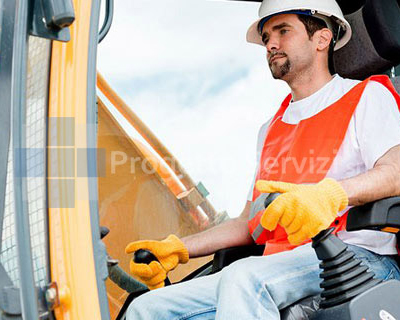
Theoretical course - practical for crane operators on wheels - 14 hours
€ 280,00 IVA esc
DESCRIPTION
Theoretical and practical course for crane operators on wheels
RECIPIENTS
According to art. 73 paragraph 4 of D.Lgs. 81/08 the workers in charge of the use of the equipment that require special knowledge and responsibilities referred to in art. 71, c. 7, must receive appropriate and specific training, information and training to enable the use of the equipment in an appropriate and safe manner, including in relation to the risks that may be caused to other persons.
The course is aimed at the operators of "cranes on wheels": motor crane comprising a column, which rotates around a base and a group of arms that is applied to the top of the column. The crane is normally mounted on a vehicle (possibly a trailer, a tractor or a fixed base) and is designed to load and unload the vehicle.
COURSE OBJECTIVES
The aim of the course is to fulfill the training obligation imposed on the employer for the training of crane operators on wheels (Art. 73 of Legislative Decree 81/08).
The contents comply with current regulations and related requirements.
At the end of the course will be issued a certificate of qualification, proven attendance equal to at least 90% of the training hours and verified the passing of the intermediate and final verification tests.
Failure to pass the final verification test entails the obligation to repeat the practical module.
BASIC GENERAL TRAINING
The training for crane operators on wheels and is equal to 14 hours.
COURSE SCHEDULE
The content of the training program respects the provisions of the agreement State Regions 22 February 2012
1. Legal module - regulatory (1 hour)
2. Technical module (3 hours)
•• • Terminology, characteristics of the different types of truck cranes with reference to the installation position, their movements and lifting equipment, configuration changes depending on the installed accessories
•• • Basic physics in order to evaluate the mass of a load and to appreciate the equilibrium conditions of a body, as well as the evaluation of the necessary attributes that allow the crane assembly with hanging load to be maintained in stable conditions.
•• • Stability conditions of a truck crane: factors and elements influencing stability
•• • Main features and main components of truck cranes
•• • Types of equipment and grippers
•• • Remote control devices
•• • Contents of documentation and signage plates supplied with truck cranes
•• • Using load tables provided by manufacturer
•• • Principles of operation, verification and adjustment of limiting devices, indicators, control
•• • General principles for transfer, positioning and stabilization
•• • Safe and Risky Use: Analysis and Assessment of Most Common Risks in Truck Crane Usage (falling cargo, loss of stability of the truck crane, collision of persons with the load or crane, environmental hazards such as wind, obstacles, power lines, etc., risks related to incorrect stabilisation)
•• • Sign Signs
3. Practical modules (8 hours)
•• • Identifying Structural Components
•• • Control and safety devices
•• • Pre-use controls• •
•• • Checks before the road transfer
•• • Lifting Operations Planning
•• • Positioning of truck crane at work
•• • Operating Practice
•• • Emergency manoeuvres
•• • Tests of communication with gestural and radio signals
•• • Practical steps to test the proper functioning of limiters, indicators and position devices.
•• • Safe Use Exercises, Emergency Situation Management, and Checklist Compilation
•• • Set-aside of truck cranes: procedures for storing accessories, blocks, stabilizers, jib, etc
4. Rating
UPDATE
The mandatory update is five years, as defined by the Agreement State Regions 22 February 2012, lasting 4 hours.
